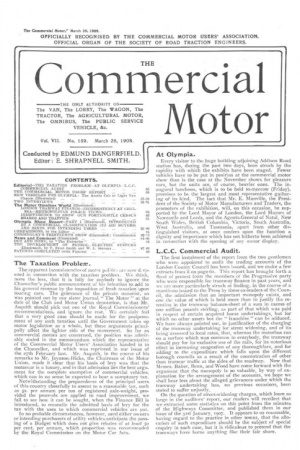The Taxation Problem..
Page 1

If you've noticed an error in this article please click here to report it so we can fix it.
The apparent inconsistencies of motor poll tic:; are now d:epened in connection with the taxation problem. We think, none the less, that it is folly for anybody to ignore the Chancellor's public announcement of his intention to add to his general revenue by the imposition of fresh taxation Upon touring cars. The grievance of the private niotorist, as was pointed out by our sister journal "The Motor " at the date of the Club and Motor Union deputation, is that Mr. Asquith should pick out one of the Royal Ccommissioner.s' recommendations, and ignore the rest. We certainly feel that a very good case should be made for the postponement of any such taxation until the Government takes up• motor legislation as a whole, but these arguments princi pally affect the lighter side of the movement. So far as commercial motors are concerned, the position was .admirably stated in the memorandum which the representative of the Commercial Motor Users' Association handed in to the Chancellor, and which was reprinted in our issue of the 27th February last. Mr. Asquith, in the course of his remarks to Mr. Joynson-Hicks, the Chairman of the Motor Union, made it clear that his basis of levy was that the motorcar is a luxury, and in that admission lies the best argo. ment for the complete exemption of commercial vehicles, which can in no sense be expected to bear a sumptuary tax. Notwithstanding the preparedness of the principal users of this country cheerfully to assent to a reasonable tax, such as .5s. per annum per ton of registered axle-weight, provided the proceeds are applied to road improvement, we fail to see how it can be sought, when the Finance Bill is introduced, to reconcile the admitted basis of levy for the tax with the uses to which commercial vehicles are put.
In no probable circumstances, however, need either owners or intending purchasers of utility vehicles anticipate the passing of a Budget which does not give rebates of at feast 50 per cent, per annum, which proportion was recommended by the Royal Commission on the Motor Car Acts.
Every visitor to the huge building adjoining Addison Road station has, during the past two days, been struck by the rapidity with which the exhibits have been staged. Fewer vehicles have to be put in position at the commercial motor show than is the case at the November shows for pleasure cars, but the units are, of course, heavier ones. The inaugural luncheon, which is to be held to-morrow (Friday), promises to be the largest and most representative gathering of its kind. The fact that Mr. E. Manville, the President of the Society of Motor Manufacturers and Traders, the promoters of the exhibition, will, on this occasion, be supported by the Lord Mayor of London, the Lord Mayors of Newcastle and Leeds, and the Agents-General of Natal, New South Wales, British Columbia, Victoria, South Australia, West Australia, and Tasmania, apart from other distinguished visitors, at once confers upon the function a dignity and importance which has not hitherto been achieved in connection with the openin.g of any motor display.
L.C.C. Commercial Audit.
The first instalment of the report from the two gentlemen who were appointed to audit the trading accounts of the London County Council has been issued, and we make a few extracts from it on page 62. This report has brought forth a flood of protest from the members of the Progressive party who were responsible for tramway finance in past years, and we are more particularly struck at finding, in the course of a manifesto issued to the Press by these ex-leaders of the Council, the admission that an important monopoly exists, and one the value of which is held more than to justify the retention in the tramway balance-sheet of a sum in excess of one million pounds sterling, as part of that which was paid in respect of certain acquired horse undertakings, but for which no other assets but the "franchise " can be adduced. We have always pointed out, in justification of the charging of the tramway undertaking for street widening, and of its being assessed to local rates, that whereas the motorbus ran on a surface which was common to everybody, the tramway should pay for its exclusive use of the rails, for its notorious effect in increasing congestion of any thoroughfare, and for adding to the expenditure which falls upon the different borough councils as a result of the concentration of other than tramcar traffic at the sides of the roadway. Now that Messrs. Baker, 13enn, and Wood have come forward with the argument that the monopoly is so valuable, by way of explanation for the arrangement of the accounts, we hope we shall hear less about the alleged grievances under which the tramway undertaking has, on previous occasions, been stated to suffer unjustly..
On the question of street-widening charges, which loom so large in the auditors' report, our readers will recollect that we extracted some statistics on this point from the minutes of the Highways Committee, and published them in our issue of the 31st January, 1907. It appears to us reasonable, having regard to the practice in other towns, that the allocation of such expenditure should be the subject of special enquiry in each case, but it is ridiculous to pretend that the tramways have borne anything like their fair share.




































